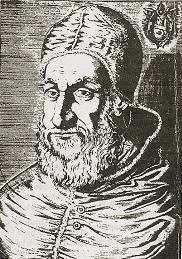 Felice Peretti (1521-1590) was elected Pope Sixtus
V in 1585, and remained in office until his death
in 1590. His family had fled to Italy from the Turks
in the middle of the preceding century; the family
was in consequence very poor. He went to the Minorite
convent at Montalto when he was nine years old;
three years later he became a novice. He received
his education at Montalto, Ferrara, and Bologna
and was ordained as a priest at Siena in 1547. He
had talent as a preacher, which gained him the support
of influential men in Rome. He was rector of his
successive convents at Siena, Naples, and Venice.
In 1557 Pope Pius IV appointed him to the Inquisition
at Venice. His zeal and severity as inquisitor displeased
the Venetian Government, which demanded and obtained
his recall in 1560. Back in Rome he became a counselor
to the Holy Office, a professor at the Sapienza,
and vicar Apostolic of his order. Pius V made him
Bishop in the Kingdom of Naples in 1566, and in
1570, made him a cardinal-priest. During the reign
of Pope Gregory XIII he withdrew from public affairs,
preferring to study and to collect of works of art.
Felice Peretti (1521-1590) was elected Pope Sixtus
V in 1585, and remained in office until his death
in 1590. His family had fled to Italy from the Turks
in the middle of the preceding century; the family
was in consequence very poor. He went to the Minorite
convent at Montalto when he was nine years old;
three years later he became a novice. He received
his education at Montalto, Ferrara, and Bologna
and was ordained as a priest at Siena in 1547. He
had talent as a preacher, which gained him the support
of influential men in Rome. He was rector of his
successive convents at Siena, Naples, and Venice.
In 1557 Pope Pius IV appointed him to the Inquisition
at Venice. His zeal and severity as inquisitor displeased
the Venetian Government, which demanded and obtained
his recall in 1560. Back in Rome he became a counselor
to the Holy Office, a professor at the Sapienza,
and vicar Apostolic of his order. Pius V made him
Bishop in the Kingdom of Naples in 1566, and in
1570, made him a cardinal-priest. During the reign
of Pope Gregory XIII he withdrew from public affairs,
preferring to study and to collect of works of art.
After Gregory XIII died in 1585 Peretti was elected pope, taking the name Sixtus V. He was a stern and harsh ruler, of necessity: Rome at the time was plagued with brigands and bandits. Sixtus soon resolved the problem by exterminating the bandit gangs, making Rome one of the safest cities in Europe. He also rebuilt the papal finances, which were in great disarray. He believed that riches as well as severity were necessary for good government, and by using every available means to extract increased taxes, soon had accumulated great wealth. He spent this wealth freely, mostly on public architecture, including the building of the Lateran Palace; the raising of obelisks at the Vatican and elsewhere; the completion of the cupula of St Peter's and the Quirnal; the restoration of several churches and the Trajan column (on which he placed a statue of St Peter; the construction of monasteries; the establishment of the Vatican library and its associated press; and a new aqueduct, twenty miles long, to bring water to the city.
Because of his severity, he was not a popular pope. A statue which had been erected in his honor on the Capitol during his lifetime was torn down by the people immediately upon his death.
